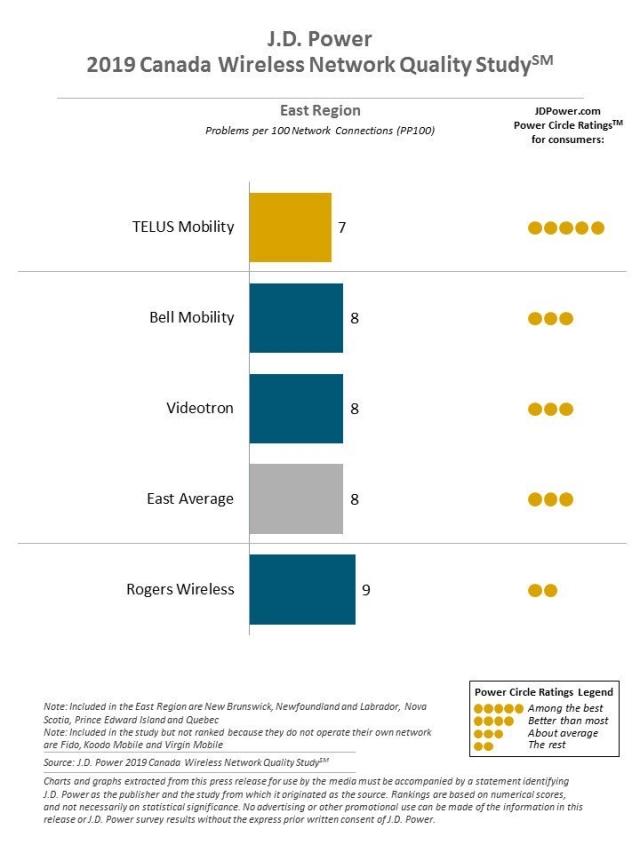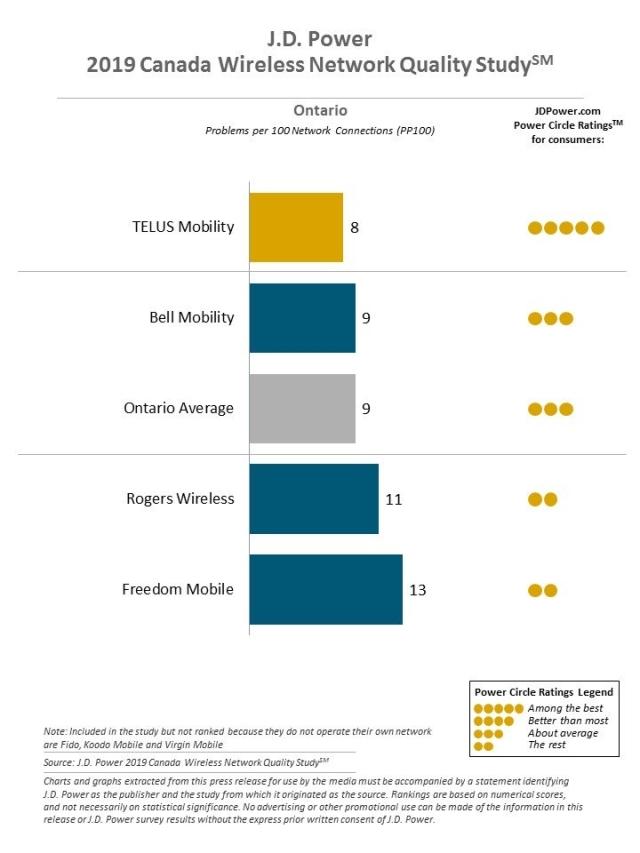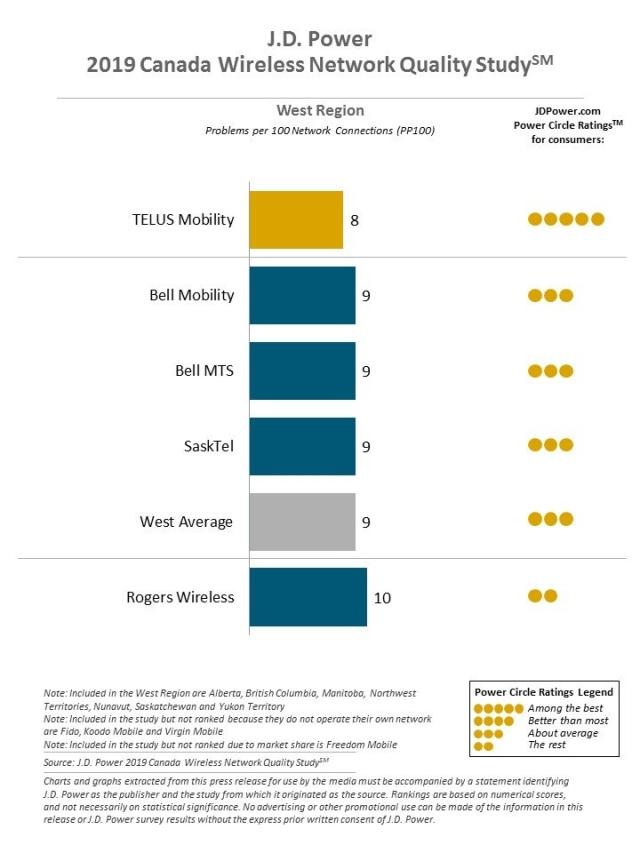Wireless Network Quality Improves But Carriers at Risk of Losing Young Customers, J.D. Power Finds
TELUS Mobility Ranks Highest in Network Quality Across All Three Regions
TORONTO: 9 May 2019 — The heavy investments by wireless carriers in Canada related to infrastructure enhancements are improving customer satisfaction with network quality, according to the J.D. Power 2019 Canada Wireless Network Quality Study,SM released today. Overall, wireless network issues, measured by problems per 100 connections (PP100), have dropped to 9 PP100 from 11 PP100 in 2017.
While improved satisfaction in network quality is seen across all markets in Canada, the positive news comes with a caveat. According to the study, Gen Y1and Gen Z customers, the heaviest users of mobile data, are experiencing a significantly higher rate of connectivity problems than customers in other age groups. Gen Y and Gen Z customers are the most prolific users of plans over 5GB (46% and 48%, respectively), and cite a high level of web issues (14 PP100 for Gen Y and 19 PP100 for Gen Z). This is higher than the number of issues cited by Boomers (8 PP100) and Pre-Boomers (5 PP100).
“Wireless network quality is an important brand promise,” said Adrian Chung, Director of the Technology, Media & Telecom Practice at J.D. Power in Canada. “When customers experience connectivity issues, it negatively affects their perception of reliability and erodes trust. While younger customers tend to be more price sensitive, they are heavier users of data. Wireless carriers that want to reduce potential churn should focus on understanding the data problems experienced and better align plans to meet the data needs and expectations of these customers.”
According to the study, Gen Y and Gen Z customers rate wireless provider reliability lower (5.7 points on a 1-7 scale), compared with Gen X (5.8), Boomers (6.1) and Pre-Boomers (6.2). Additionally, 40% of Gen Z customers cite price as the main reason for ending their relationship with a carrier.
Following are some key findings of the 2019 study:
- From a phone to a communications hub: Younger customers, especially Gen Y and Gen Z, use their mobile devices as a communications hub rather than just as a phone. Gen Z customers sent/received an average of more than 90 text messages within a recent 48-hour span, compared with only 12 text messages sent/received by Pre-Boomers. Also, Gen Z and Gen Y customers use apps on their devices three to six times more frequently (24.9 and 20.4 times, respectively) than Boomers (7.2 times) and Pre-Boomers (3.7 times).
- Data suckers: Among younger customers, the changing function of smart phones leads to an increase in the number of apps they host on their devices. The number of apps hosted and used is nearly doubled with each generation through Gen Y. The most common apps used by Gen Y and Gen Z include instant messaging (72% vs. 78%, respectively); social networking (70% vs. 75%); listening to music (65% vs. 81%); and mobile payments (43% vs. 46%).
- Need for speed: Younger customers have the highest satisfaction with the speed of their devices. Among Gen Z customers, 13% say data speeds are higher than expected, followed by Gen Y (9%), Gen X (7%), Boomers (7%) and Pre-Boomers (2%). This is due, in most cases, to younger customers owning newer phones with improved technology.
Study Rankings
In the East region, TELUS Mobility ranks highest in network quality with 7 PP100. The East region consists of the provinces of New Brunswick, Newfoundland and Labrador, Nova Scotia, Prince Edward Island and Quebec. Bell Mobility and Videotron rank second in a tie with 8 PP100.
In Ontario, TELUS Mobility ranks highest with 8 PP100. Bell Mobility (9 PP100) ranks second.
TELUS Mobility ranks highest in the West region with a score of 8 PP100. The West region consists of the provinces of Alberta, British Columbia, Manitoba, Northwest Territories, Nunavut, Saskatchewan and Yukon Territory. Bell Mobility, Bell MTS and SaskTel rank second in a tie with 9 PP100 each.
The 2019 Canada Wireless Network Quality Study was conducted online in English and French. The study, which measures problems per 100 connections (PP100), includes seven wireless carriers in the East region; seven wireless carriers in Ontario; and nine wireless carriers in the West region. The study is based on 13,900 responses and was fielded in February-March 2019.
For more information about the Canada Wireless Network Quality Study, visit https://canada.jdpower.com/business/resource/canadian-wireless-network-quality-performance-study.
J.D. Power is a global leader in consumer insights, advisory services and data and analytics. These capabilities enable J.D. Power to help its clients drive customer satisfaction, growth and profitability. Established in 1968, J.D. Power has offices serving North America, South America, Asia Pacific and Europe.
Media Relations ContactsGal Wilder, Cohn & Wolfe; 647-259-3261; gal.wilder@cohnwolfe.ca
Sandy Caetano, Cohn & Wolfe; 647-259-3288: sandy.caetano@cohnwolfe.caGeno Effler, J.D. Power; Costa Mesa, Calif.; 714-621-6224; media.relations@jdpa.comAbout J.D. Power and Advertising/Promotional Rules: http://www.jdpower.com/business/about-us/press-release-info
1J.D. Power defines generational groups as Pre-Boomers (born before 1946); Boomers (1946-1964); Gen X (1965-1976); Gen Y (1977-1994) and Gen Z (1995-2004).


